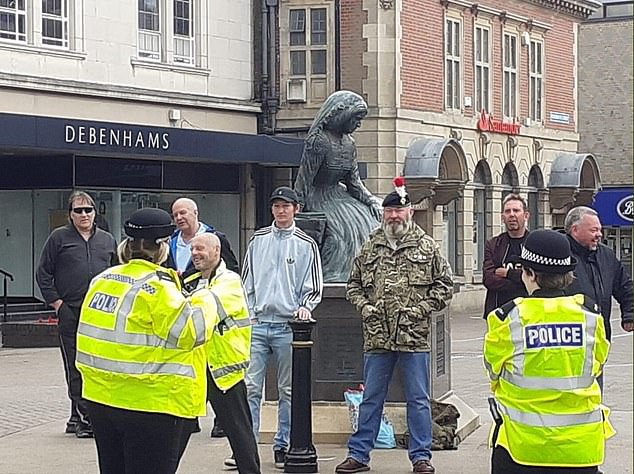‘Are they worried about Jane Austen fans?’: Statue defenders draw scorn as they stand in front of sculpture of writer George Eliot during Black Lives Matter protest
- The ‘defenders’ surrounded a statue of George Eliot in Nuneaton, Warwickshire
- The writer was a known critic of slavery and she strongly opposed anti-semitism
- Statue defenders have been surrounding and ‘guarding’ monuments all over UK
Statue defenders have been mocked for standing between Black Lives Matter protesters and a sculpture of writer George Eliot .
A group of men, including veterans, stood guard over the George Eliot statue in Nuneaton, Warwickshire, just yards away from a BLM protest on Sunday afternoon.
However, photos of them surrounding the statue have triggered scorn online, with many pointing out that Eliot was a vocal opponent of slavery and anti-semitism.
‘Protect the statue’ groups have started to form all over the country after BLM protesters pulled down a monument to slave trader Edward Colston in Bristol.
There have been calls for the statues of other British historical figures involved in the slave trade to also be pulled down.
Eliot – being a critic of slavery and oppression – was not targeted in a list of statues of slavers published by BLM supporters last week.
A group of men stood guard over the George Eliot statue in Nuneaton, Warwickshire, just yards away from a BLM protest on Sunday
However, this has spawned statue defenders, who have since appeared at BLM protests and clashed with both them and police officers.
In Nuneaton, the protest and subsequent counter-protest remained peaceful, with a throng of ‘protectors’ surrounding the statue of Eliot.
Particularly in her later years, Eliot appeared to be a strong supporter of anti-slavery.
In essays, Eliot lavished praise on the anti-slavery works of Harriet Beecher Stowe, who depicted the struggles of African-American slaves and championed the abolition of slavery.
She also explored the topic of ‘conflict between races’ with her novel Daniel Deronda exploring racial identity and shocking Victorian Britain with its sympathetic view of Jews – she also wrote about the ‘debt’ Western people had towards Jews.
Corry Bates, formerly of the first batallion of the Royal Regiment of Fusiliers, was one of the men who ‘protected’ her statue in Nuneaton on Sunday.
He said: ‘I heard about the protest on Friday and obviously what has been going elsewhere, I’m here purely to protect our history.
‘I’m not against the protest whatsoever, everyone has the right to do it, I’m purely here to protect our history.’
Around 200 people attended the BLM protest, which passed peacefully, according to officials.
Many people turned out with homemade signs with statements including ‘Black Lives Matter’ and ‘I will never understand but I stand’ and ‘took a knee’ as speeches were given.







JB Benjamin, of the Nuneaton Bedworth Bulkington Black Lives Matter (NBB BLM) who organised the protest, said: ‘It has gone pretty well, apart from one minor incident with an agitator at around 2.30pm, the people at the protest have been peaceful and socially distanced.
‘I was pleased to see so many people and also pleased that the young socialist party had also come to show their support.’
Other statue defenders were spread across four memorials – the Gurkha memorial, the Royal Regiment of Fusiliers, the Boer War and the main war memorial.
Social media users mocked the George Eliot defenders after photos were shared online.
One said: ‘Oh my god … they are … *rubs eyes* they really are guarding the statue of George Eliot in Nuneaton.’
A second added: ‘A group of men, including veterans, stood watch over the George Eliot statue in Market Place.
‘I really hope the Jane Austen crew doesn’t turn up looking for trouble.’
While a third commented: ‘Good to see #GeorgeEliot being protected this morning from the threatened attacks by the fierce loyalists of the Bronte Liberation Front, Gaskell’s Characters Matter, and the Austen Supremacy Party.’
